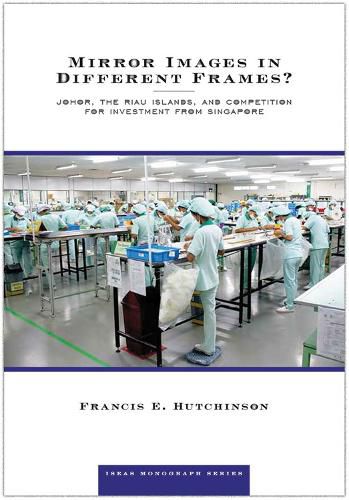Readings Newsletter
Become a Readings Member to make your shopping experience even easier.
Sign in or sign up for free!
You’re not far away from qualifying for FREE standard shipping within Australia
You’ve qualified for FREE standard shipping within Australia
The cart is loading…






This title is printed to order. This book may have been self-published. If so, we cannot guarantee the quality of the content. In the main most books will have gone through the editing process however some may not. We therefore suggest that you be aware of this before ordering this book. If in doubt check either the author or publisher’s details as we are unable to accept any returns unless they are faulty. Please contact us if you have any questions.
In the early 1990s, Singapore, the Malaysian state of Johor, and the Riau Islands in Indonesia sought to leverage their proximity, differing factor endowments, and good logistics connections to market themselves as an integrated unit. Beyond national-level support in all three countries, the initiative had the support of state and provincial leaders in Johor and Riau, respectively.
Now, however, the situation is markedly different. The Malaysian government and its Johorean equivalent have invested considerable resources in encouraging closer integration with Singapore. For its part, the Indonesian central government has been promoting special economic zones and export-oriented activities. However, the provincial government of the Riau Islands has turned away from export-oriented industrialization, preferring instead to promote cultural sub-nationalism and traditional economic activities such as fishing and small-scale farming.
This development is counter-intuitive. Traditional fiscal federalism theory argues that decentralization encourages competition between provinces for investment, jobs, and growth. While Indonesia has undergone one of the world’s most far-reaching decentralization reforms, Malaysia has pursued a consistent centralization campaign at the expense of state governments. Thus, we would expect the Riau Islands entrepreneurial drive to be unleashed, and Johor’s to be smothered.
However, Johor’s drive for capital is undiminished, while the Riau Islands pursuit of investment has dissipated. This monograph will explore the reasons for this paradox.
$9.00 standard shipping within Australia
FREE standard shipping within Australia for orders over $100.00
Express & International shipping calculated at checkout
This title is printed to order. This book may have been self-published. If so, we cannot guarantee the quality of the content. In the main most books will have gone through the editing process however some may not. We therefore suggest that you be aware of this before ordering this book. If in doubt check either the author or publisher’s details as we are unable to accept any returns unless they are faulty. Please contact us if you have any questions.
In the early 1990s, Singapore, the Malaysian state of Johor, and the Riau Islands in Indonesia sought to leverage their proximity, differing factor endowments, and good logistics connections to market themselves as an integrated unit. Beyond national-level support in all three countries, the initiative had the support of state and provincial leaders in Johor and Riau, respectively.
Now, however, the situation is markedly different. The Malaysian government and its Johorean equivalent have invested considerable resources in encouraging closer integration with Singapore. For its part, the Indonesian central government has been promoting special economic zones and export-oriented activities. However, the provincial government of the Riau Islands has turned away from export-oriented industrialization, preferring instead to promote cultural sub-nationalism and traditional economic activities such as fishing and small-scale farming.
This development is counter-intuitive. Traditional fiscal federalism theory argues that decentralization encourages competition between provinces for investment, jobs, and growth. While Indonesia has undergone one of the world’s most far-reaching decentralization reforms, Malaysia has pursued a consistent centralization campaign at the expense of state governments. Thus, we would expect the Riau Islands entrepreneurial drive to be unleashed, and Johor’s to be smothered.
However, Johor’s drive for capital is undiminished, while the Riau Islands pursuit of investment has dissipated. This monograph will explore the reasons for this paradox.